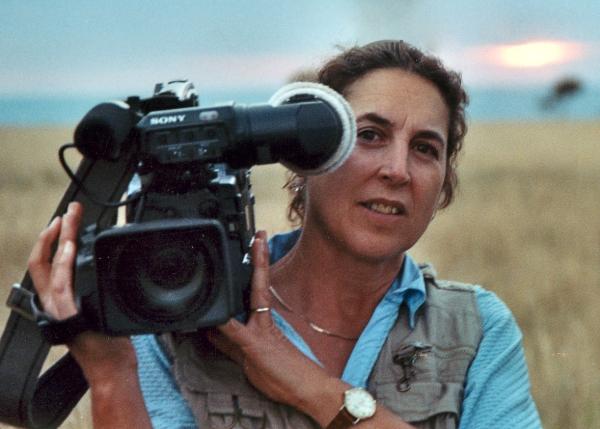Appalshop
National Humanities Medal
2022

Appalshop filmmaker Mimi Pickering.
—Appalshop

Appalshop filmmaker Mimi Pickering.
—Appalshop
Born as an act of cultural rebellion in the 1960s, Appalshop continues to mirror and shape the Appalachian region it serves. The community arts organization first came to prominence in the 1970s for its documentary filmmaking. Appalshop’s archive includes ephemera associated with a catalog of more than one hundred films, but the full collection reflects the organization’s other, varied activities to cultivate, create, and promote mountain-made music, literature, photography, and theater—offering support to the communities from which these art forms emerge. A champion of public humanities across the southern mountains and nation, Appalshop sponsors educational programming informed by a deep awareness of the region it calls home.
Appalshop’s members see creative expression as a transformational act, something at the heart of their own origin story. The organization’s roots lie in the Appalachian Film Workshop, part of Lyndon Johnson’s War on Poverty, which was intended to train rural mountain people for careers at television stations in faraway cities. But the young people recruited into the program didn’t want to leave. They chose instead to use emerging media technology to serve their own mountain communities. They began to create films, plays, albums, and other projects that challenged prevailing stereotypes about Appalachian life. Eventually, they renamed the organization Appalshop—and from their offices in Whitesburg, Kentucky, emerged such iconic works as the play Red Fox/Second Hangin’ (1976), the film Stranger with a Camera (1999), and the album No Options: Hip-Hop in Appalachia (2024).
“At Appalshop the 1960s never died,” the media scholar Patricia Aufderheide has written. “They just grew up.”
Appalshop has continued to remake itself across five decades, its work reflecting changes in the region itself. In the early 2000s, two volunteer DJs at Appalshop’s community radio station, WMMT, fulfilled a request by dedicating a song to a caller’s loved one. This would have been unremarkable except that the two DJs—both coal miners—learned that the caller was out of town, and the listener was imprisoned in a maximum-security facility that had been built on a former strip mine. This moment of inspiration spawned “Calls from Home,” a show that allows family members to communicate via radio waves that penetrate prison walls. The show spun off into a theater piece, a film, and an array of similar programs. Through grassroots creativity and an inclusive notion of community, Appalshop broke down barriers. In the process, they changed lives.
Remarkable programming such as this caught the attention of the organization’s executive director, Tiffany Sturdivant. A native of Mississippi, Sturdivant was working for a campaign to support formerly incarcerated people when, in 2020, she took a position as the lead organizer for Performing Our Future, an Appalshop theater project that brings together artists to reflect on connections between their home communities. The work pulled her in, and the program’s novel approach to development inspired her. A proud booster of Appalshop’s work to date and the first Black woman to lead the organization, Sturdivant encourages her staff to use their media resources to be inclusive as they celebrate the culture of the mountain South.
The Central Appalachian Floods of 2022 devastated East Kentucky and presented Appalshop with an existential crisis just as it was completing a generational transition within its staffing structure. Tommy Anderson, a staff member who has been involved in Appalshop programming since he was twelve years old, recalls that the organization came together to rescue items from the Appalshop Archive. Then its people spread into the community to assist with recovery efforts.
“Appalshop put a lot of trust in their employees to do what they needed to do,” Anderson remembered. “We were working overtime—day-in and day-out—to try to meet the needs of our neighbors and our community members, no matter who they were.” Pivoting from its stewardship of the past to the urgent needs of the present, the organization harkened back to its founding spirit. “There were a lot of young people trying to inhabit the body of a fifty-year-old organization that had done a lot to preserve arts and culture,” Anderson said, “but these young people were also wanting to create new culture and new traditions.”
Sturdivant built on this idea in describing the diverse participants engaged in Appalshop’s current programs. “It's my hope that the trials and triumphs of this coalition will help to shape the future of Appalshop to expand our Appalachian identity and create a space where everyone feels they belong.” An organization that has used the humanities to invert stereotypes about Appalachian people now seeks to empower a new generation to tell more expansive stories about life in the mountains.
—Jeffrey Keith